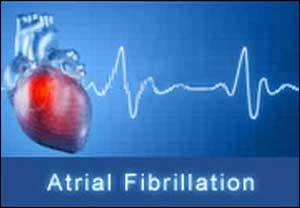- Home
- Editorial
- News
- Practice Guidelines
- Anesthesiology Guidelines
- Cancer Guidelines
- Cardiac Sciences Guidelines
- Critical Care Guidelines
- Dentistry Guidelines
- Dermatology Guidelines
- Diabetes and Endo Guidelines
- Diagnostics Guidelines
- ENT Guidelines
- Featured Practice Guidelines
- Gastroenterology Guidelines
- Geriatrics Guidelines
- Medicine Guidelines
- Nephrology Guidelines
- Neurosciences Guidelines
- Obs and Gynae Guidelines
- Ophthalmology Guidelines
- Orthopaedics Guidelines
- Paediatrics Guidelines
- Psychiatry Guidelines
- Pulmonology Guidelines
- Radiology Guidelines
- Surgery Guidelines
- Urology Guidelines
Atrial fibrillation linked to higher odds of dementia

People with atrial fibrillation may experience a faster decline in cognitive abilities and increased risk of dementia, according to a new study published in the journal Neurology. In addition to this person with AF who were taking anticoagulants were actually less likely to develop dementia than those who did not take blood thinners.
With atrial fibrillation (AF), a form of arrhythmia, the heart's normal rhythm is out of sync. As a result, blood may pool in the heart, possibly forming clots that may go to the brain, causing a stroke.
Chengxuan Qiu, of the Karolinska Institute and Stockholm University in Sweden, and colleagues conducted the study to examine the association of AF with cognitive decline and dementia in old age, and to explore the cognitive benefit of antithrombotic treatment in patients with AF.
"Compromised blood flow caused by atrial fibrillation may affect the brain in a number of ways," said Qiu. "We know as people age, the chance of developing atrial fibrillation increases, as does the chance of developing dementia. Our research showed a clear link between the two and found that taking blood thinners may actually decrease the risk of dementia."
For the study, researchers looked at data on 2,685 participants with an average age of 73 who were followed for an average of six years as part of a larger study. Participants were examined and interviewed at the start of the study and then once after six years for those younger than 78 and once every three years for those 78 and older. All participants were free of dementia at the start of the study, but 243 people, or 9 percent, had atrial fibrillation.
Through face-to-face interviews and medical examinations, researchers gathered lifestyle and medical data on participants at the start of the study and during each follow-up visit. All were screened for atrial fibrillation, for overall thinking and memory skills, as well as dementia.
Also Read: Stroke doubles dementia risk, concludes large-scale study
Key Findings:
- Over the course of the study, an additional 279 people, or 11 percent, developed atrial fibrillation, and 399, or 15 percent, developed dementia.
- Researchers found that those who had atrial fibrillation had a faster rate of decline in thinking and memory skills than those without the condition and were 40 percent more likely to develop dementia.
- Of the 2,163 people who did not have an irregular heartbeat, 278 people developed dementia or 10 percent.
- Of the 522 people with irregular heartbeat, 121 developed dementia or 23 percent.
- people who took blood thinners for atrial fibrillation had a 60 percent decreased risk of dementia.
- Of the 342 people who did not take blood thinners for the condition, 76 people developed dementia or 22 percent.
- Of the 128 people taking blood thinners, 14 developed dementia or 11 percent.
- There was no decreased risk among people who took an antiplatelet treatment like aspirin.
"Assuming that there was a cause-and-effect relationship between using blood thinners and the reduced risk of dementia, we estimated that about 54 percent of the dementia cases would have been hypothetically prevented if all of the people with atrial fibrillation had been taking blood thinners," Qiu said. "Additional efforts should be made to increase the use of blood thinners among older people with atrial fibrillation."
A limitation of the study was that researchers could not distinguish subtypes of atrial fibrillation such as persistent or permanent. It is also possible that some cases of atrial fibrillation may have been missed among people who did not show any symptoms.
"AF is associated with a faster global cognitive decline and an increased risk of dementia in older people. Use of anticoagulant drugs may reduce dementia risk in patients with AF," concluded the authors.
For further reference log on to https://doi.org/10.1212/WNL.0000000000006456

Disclaimer: This site is primarily intended for healthcare professionals. Any content/information on this website does not replace the advice of medical and/or health professionals and should not be construed as medical/diagnostic advice/endorsement or prescription. Use of this site is subject to our terms of use, privacy policy, advertisement policy. © 2020 Minerva Medical Treatment Pvt Ltd